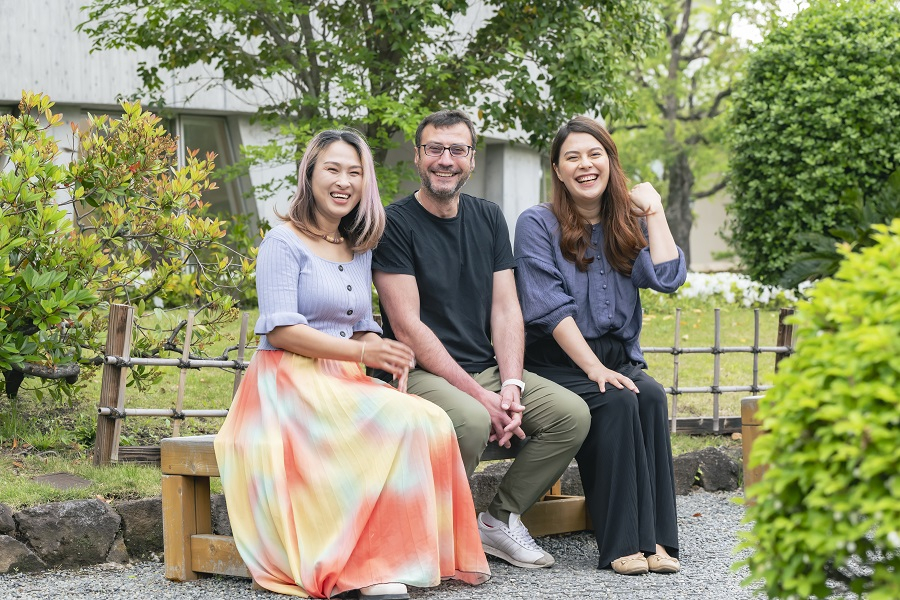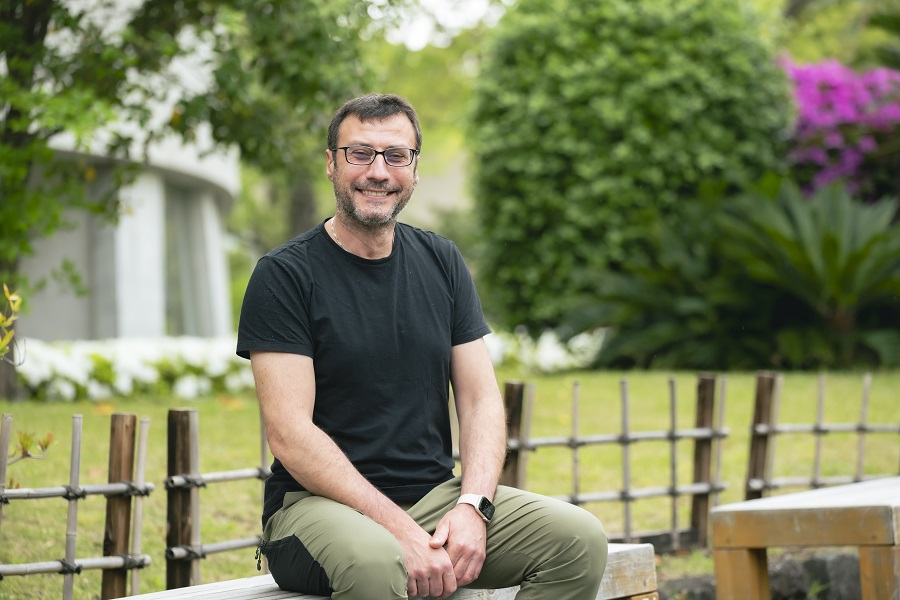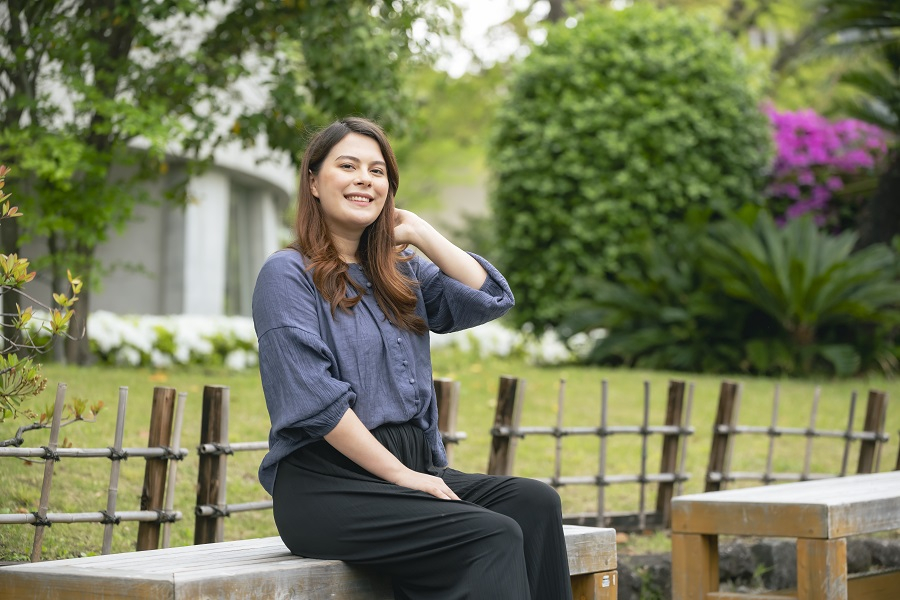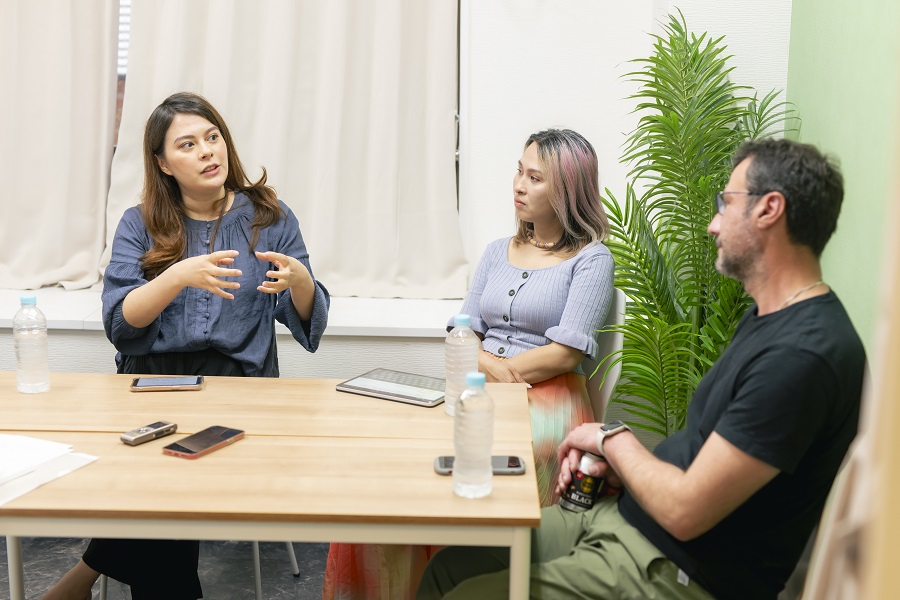Intercultural Crosstalk
Work and Activities That Connect Japan and Their Home Country -About Future Plans-

See their profiles here
Click for "1st Round" Here
About Future Plans
We are bringing you a 3-part series of roundtable discussions on "Work and Activities That Connect Japan and Our Home Country".
This is the 3rd and final part of the series. The participants talked about the rewards and difficulties of their current work and activities. What plans do the three of them have for expanding their activities in the future?
Despite their differences in activities, they had very positive things to say.
What Motivates You?

I teach children with foreign roots, from learning the hiragana alphabet, where even children who can't hold a pencil or don't want to write at first, after a few weeks they can write and read. Children are straightforward, and giving them stamps or stickers motivates them. It also gives them a sense of self-affirmation. Seeing these children grow is one of the most rewarding aspects of my job.
Another thing is that there are children who come to Japan when they are in the upper grades of elementary school or junior high school, struggling with their feelings. As I interact with them, I feel a great sense of reward when I can be a part of the moment when they change their minds and decide to do their best here.
I'm glad I started doing YouTube. At first, I didn't have any friends in Japan, and all my friends lived in Thailand, so I did it because I was lonely. But as time passed, when I went back to Thailand, people would say things like "I saw it!" or "Can I take a picture?" or "Your child has grown up!" and there were even offline meetups*, so I was happy to know that people were watching.
I also sometimes get questions from people from Thailand who live in Japan, like "I want to eat Thai food, but how do you make it with Japanese ingredients?". To introduce simple Thai dishes, I buy the ingredients at a Japanese supermarket and cook them while explaining things like "this vegetable is similar to ○○ in Thailand". It makes me really happy when I get an email saying "I made Thai food after watching your video. Thank you".
*Offline meet-up: A gathering where people who have met through an online community meet in person.
I want to know how to make kaphrao by watching your videos too!
There are many rewarding aspects. When I play Bulgarian music, I explain the characteristics and so on, but I want people to feel the beat, not just understand it in their heads. I think the music becomes easier to understand when dancing is involved. I think the greatest satisfaction is when people listen to the performance and want to dance or feel the music itself.
Are There Things That You Find Difficult?

Some people like me, and some don't. When I get bad comments, it still hurts.
Yes, it seems like a lot of work. It's difficult because even when you convey your thoughts, you sometimes get a different answer back.
Sometimes, large media outlets in Thailand will share the articles I write. Occasionally, people who don't know me will come to my website and leave a lot of bad comments. I don't like it when people who don't know me do that.
Before doing that, the media must get permission from Yung, right? I've had to do that a few times myself. In those cases, I've told them not to share some things.
What I find difficult is that people seem to assume that Japanese language teachers are Japanese. There seems to be a resistance to the idea of foreigners teaching. I wanted to teach adults, so I applied to a Japanese language school several times, but I was rejected. The reason was that I wasn't Japanese. They said, "We're sorry, but students who pay to learn Japanese want to be taught by a native speaker."
Even in Yokohama City, where I am currently working, I don't see many Japanese language instructors with foreign roots. There are sometimes people from China, but there are no people from foreign countries who look foreign. My name is Micheli, but my Japanese name is Keiko Yoshida (a normal Japanese name). I was transferred this year, and when I introduce myself as "a Japanese teacher named Yoshida," people are surprised. They think I am an ALT (Assistant Language Teacher), and they see me as an English teacher. Children don't have such barriers, but there is still a barrier that prevents me from teaching adults. One of the difficulties is that it narrows the scope of my activities as a Japanese teacher.
In my opinion, a musician is not defined by whether they are a professional or semi-professional, but whether they are a musician or not. I think a musician is someone who can satisfy other players and audiences, not just for their own satisfaction. I've been doing this for my whole life. I ask myself whether the person sitting in front of me is enjoying themselves or not.
Whether it's a live performance or a concert, music is not a one-way street. The energy comes back from the audience. Whether it's applause or even in the quiet moments. That energy is a conversation between the musicians and the audience. We get on stage to sense and feel that.
What Makes You Feel Glad That You Kept Going?

I've been able to meet many different people and experience and learn a lot of things through my music. I've also met many wonderful Japanese musicians. Whenever I meet new people, I feel glad that I've continued with my music. I would be even happier if I could meet Bulgarian musicians in Japan.
I'm also glad that I've continued to be an influencer. For example, when you go on a trip, you research it yourself and plan where you want to go, right? Through my work as an influencer, I enjoy being able to hear new things about the places I visit, such as their past history, must-see points, and shops that the locals know about. I can also meet all kinds of people. Meeting other influencers also expands my world.
By continuing, our world expands, doesn't it?
I'm also glad that I've continued. 2 years ago, I was teaching Japanese to junior high school students, and after 2 years, I was able to receive news from some students saying "I passed ○○ high school" and that was thanks to the fact that I kept going. I think it's good that I've kept going, and I want to continue in the future, too, if I can be one of the good teachers who has a positive influence on that child's life.
In order to open the next door, the teacher needs to create an opening.
That's right. The students are the ones who open the door, but I'm there behind them, giving advice.
It's great to see the students grow.
That's what I like about it. I teach at a Japanese language support base facility, a school that students attend for just four weeks, and then they go back to their original school after that. When I visit them again as part of the follow-up support, I can hear about their progress since then. Sometimes I even get letters from elementary school students, which makes me really happy.
There are many teachers at schools who are having trouble knowing how to teach children of foreign origin. By going to visit them, I can offer advice. I think it's great that I've been able to do this, because I think I'm not only helping the children, but also having an impact on the teachers at the schools.
How Do You Want to Expand Your Activities in the Future?

I want to support young people, not just teach Japanese. When I was in junior high school, I had problems with my grades and truancy, so my school teacher told me I wouldn't be able to go to high school. When I went to a Japanese language study class to ask for advice, they taught me various methods. There are many children of foreign origin who give up on going to high school or university. I want to support them by teaching them things like how their grades can improve if they work a little harder, or how they can get a scholarship. I think there are things I can do to help them, such as studying together with them to prepare for university entrance exams, while also combining this with my current job as a Japanese language teacher.
I've been asked if I would like to have my own brand of cosmetics or other products as an influencer, but I don't want to do that. I'm continuing because it's fun, so I want to keep that in mind. I think it's fine to share information about the differences between Japanese and Thai schools, the price of school uniforms, and everyday life, as long as I don't get greedy and just feel happy within my own limits. When my husband retires, I want to travel around Japan by car and upload videos of my travels on YouTube. When I finish my travels in Japan, I want to go back to my village in Thailand and teach English and Japanese to all the children in the village. I want to do this for myself, not for the money.
My goal is to make people more aware of Bulgarian music, songs and dances, but as society is changing, I think I need to think about how best to communicate this. It's difficult. I think we too need to change.
What did you think of the round-table discussions on "Work and Activities That Connect Japan and Our Home Country"?
Despite encountering various difficulties in their work and activities that connect Japan and their home countries, the 3 participants said that they are glad they have continued with their work. It seems that the encounters with various people through their work and activities have also become a source of motivation for them to continue.
This series ends with this installment, and from September we will be bringing you a new series: "Let's Talk about Japanese Language Classes and Support in the Communities".
